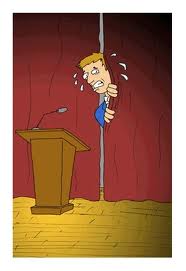So there I was, cruising along toward the first major Toastmasters benchmark of 10 speeches. I gave my ninth speech this week.
In every speaker’s career comes a speech, or perhaps more than one, that  he or she beats himself or herself up over. In his blog, Manner of Speaking, Toastmaster John Zimmer summarizes some of the things that can go wrong:
he or she beats himself or herself up over. In his blog, Manner of Speaking, Toastmaster John Zimmer summarizes some of the things that can go wrong:
- Did you ever forget what you wanted to say?
- Did you ever get lost, or stuck in traffic en route, and arrive too late?
- Did you ever have trouble speaking because you were so nervous?
- Did the equipment ever stop working and leave you in the lurch?
- Did the audience ever ask questions you couldn’t answer?
- Did you ever lose a speech contest?
- Did you ever get negative feedback?
- Did you ever get laughed at?
- Did you ever miss out on a sale or business opportunity or contract or job because of a bad presentation?
- Did you ever think that you were not cut out to be a public speaker?
I had practiced my ninth speech to the same excessive extent as usual, rehearsing in 10 times the morning of the speech. I knew it cold.
But during the speech, several distracting things happened to totally make me lose my mojo. Our Toastmasters banner fell off the lectern. I may have knocked if off; I couldn’t tell you because I was in that speaker’s zone where you’re not that aware of your surroundings. Then a guest’s cellphone emitted a loud, obnoxious ringtone; he didn’t know to turn it off for the meeting.
Both interruptions threw me off my game. In two spots in the speech, I blanked out on the next line and had to peek at my cheatsheet.
But perhaps worse than the distractions and forgotten lines, I felt I was just not connecting with the audience. I could tell by their facial expressions. I’m not sure why I didn’t connect.
I know I was not as committed to this speech as I have been to others. I had planned for a long time that this topic — steps to success for young women — would be the subject of my ninth speech, but as I worked on it, I became less and less in love with it.
It had no stories. I of all people should know that a speech is always better with stories.
Despite my personal disappointment with my performance, I know that if I didn’t have any setbacks as a speaker, I probably wouldn’t grow or learn anything. My ninth speech was no triumph, but it may have taught me to pick topics about which I have more conviction, to include stories in my speeches, and to become less unnerved by distractions.
Rolling with the punches is the point of Zimmer’s post:
Every time we stand up in front of others, we are taking a risk. Things can, and do, go wrong. We can get hurt in the process. Sometimes a little, sometimes more than a little. It’s part of the deal; it’s part of the process; it’s part of the price of admission.
If you’ve never had a bad public speaking experience, chances are you haven’t done much public speaking. If you want to improve, there is only one real way and that is to speak. And if you speak, you will certainly have setbacks. You can’t avoid them forever.
Public speaking is a risk. Just like life. But if you persevere, the rewards are tremendous.
